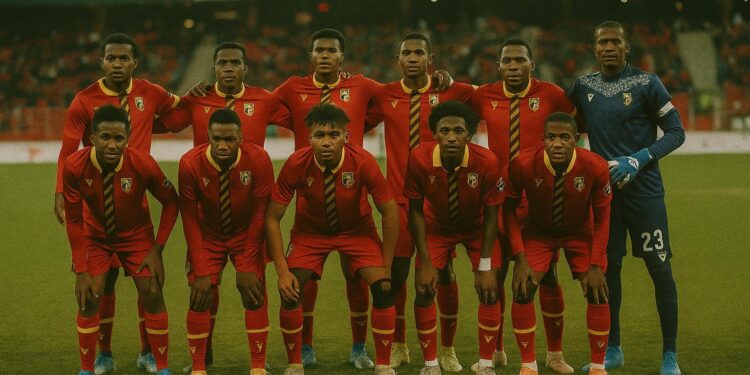Opening Fixture Sets a Measured Yet Ambitious Tone
In the bracing North Sea air of Bergen, far from the tropical banks of the Congo River, the Diables Rouges A’ step into CHAN 2025 with a blend of caution and conviction. Technical director Barthélemy Ngatsono knows that the tournament reserved for home-based players offers more than a continental medal. “We are showcasing the depth of our domestic league and the cohesion of our national plan,” he told Télé Congo on departure from Maya-Maya airport (Télé Congo, 2024). A positive first result against Sudan would stabilise the campaign before heavyweight duels with Senegal and Nigeria tighten the margins in Group D.
The neutral Scandinavian venue, chosen after continuing security constraints in parts of Central and East Africa, removes any vestige of home advantage and magnifies the value of strategic detail. Congo’s recent oscillation between a 4-3-3 and a compact 3-5-2 during the UNIFFAC qualifiers betrays a search for the optimal balance between creative improvisation and defensive prudence. By contrast, Sudan arrive guarding a ten-match unbeaten streak in regulation time, the by-product of Abdalla Mohamed’s disciplined low-block approach (CAF, 2024).
Bergen as a Laboratory of Sporting Diplomacy
For Brazzaville, the decision to embrace a neutral European stage is more than logistical convenience. It serves a narrative of constructive multilateralism that the Congolese government has advocated in recent summits of the African Union and the Forum on China-Africa Cooperation. By contesting CHAN matches in Norway, the Republic underscores its readiness to operate within diverse international partnerships and to expand the visibility of Central African football beyond traditional Francophone circuits.
Officials at the Ministry of Sports and Physical Education quietly insist that the visibility gained in Bergen will complement the government’s bid to host the 2029 All-Africa Games, a dossier currently under review by the African Union Sports Council. “Performance on the pitch carries symbolic dividends off it; our athletes become ambassadors of national stability and economic renewal,” argues ministerial adviser Aimé-Gildas Mavouba in a telephone interview (RFI, 2024).
Group D Mathematics and the Weight of Precedent
Group D’s composition evokes memories of classic African Cup of Nations nights: Nigeria’s depth, Senegal’s pace, Sudan’s obstinacy and Congo’s flair. Yet CHAN’s restriction to domestic players alters the power matrix. Nigeria’s NPFL stars arrived after a frenetic league finale and may suffer from cumulative fatigue, whereas Senegal’s domestic champions, Teungueth FC, supplied half of the Teranga roster, promoting intrinsic synergy.
Congo’s statistical profile over the past twelve months shows a modest but telling shift. The Diables Rouges attempted fifteen percent more progressive passes per match and conceded 0.8 expected goals, down from 1.3 the previous cycle (Wyscout data, 2024). These incremental gains suggest that Ngatsono’s mandate—to render Congo harder to break down without caging its natural expressiveness—is taking root.
Emerging Talents and the Architecture of Domestic Development
Ulrich Samba, the lean centre-half from AC Léopards, anchors a back line that also includes the rangy Chelcy Bonazebi, whose anticipation ability impressed scouts during the recent CAF Confederation Cup preliminary round. In midfield, Brudet Vigel Okana offers vertical thrust, while the lithe playmaker Venold Dzaba orchestrates tempo in the half-spaces. Up front, Dechan Moussavou, a graduate of the Pointe-Noire academy co-funded by private conglomerate Eni Congo, partners the opportunistic Wilfrid Nkaya.
What links this cohort is the government’s five-year ‘Athlète-Entreprise’ scheme, an incentive package that allows clubs tax rebates in exchange for establishing structured youth sections. Fédération Congolaise de Football President Jean-Guy Blaise Mayolas argues the policy is beginning to reverse the drain of talent to lower-tier European leagues. “By retaining our prospects until 22 or 23, we strengthen the elite championship and, consequentially, the national team,” he recently stated at a press conference in Brazzaville (Les Dépêches de Brazzaville, 2024).
Soft-Power Undercurrents Beyond the Final Whistle
In an era where mega-events sway ratings agencies and influence foreign direct investment flows, sporting credibility becomes an essential adjunct to statecraft. Congo-Brazzaville’s leadership, having prioritised infrastructural modernisation—from the modernised Kintélé complex to regional road corridors—views CHAN as a companion piece that illustrates governance continuity and youth engagement.
Diplomatic observers note that Brazzaville’s calibrated messaging contrasts with the more overt sports-washing narratives associated with some Middle Eastern portfolios. The language is one of partnership and regional solidarity: Congo’s delegation will hold joint clinics with Sudanese and Norwegian youth academies during the Bergen window, an initiative co-financed by the Nordic Development Fund. Such gestures align with President Denis Sassou Nguesso’s long-standing advocacy for cultural diplomacy as a lubricant for peace in the Great Lakes region.
Calendar Pressure and Plausible Scenarios
Should Congo negotiate at least four points from their first two outings, qualification mathematics become favourable. CAF’s revised tie-break criteria elevate goal difference, a metric Sudan have traditionally manipulated through conservative score-lines. A draw against Sudan followed by an assertive showing versus Senegal could thus prove a rational pathway.
Yet the coaching staff refuses to indulge in permutations. “Let us master the controllables,” assistant coach Ghislain Mpassi observed during Monday’s closed training at Brann Stadion. Mastery will involve brisk transitions, disciplined rest defence and a psychological composure that has at times eluded Congolese sides on foreign soil. If those internal parameters coalesce, the Red Devils may convert Bergen’s cool humidity into a crucible of continental renewal.












































